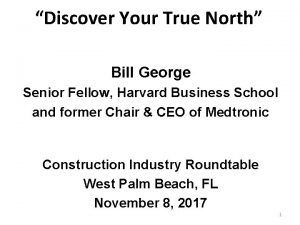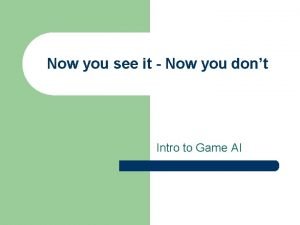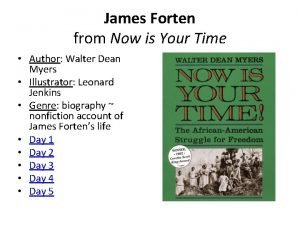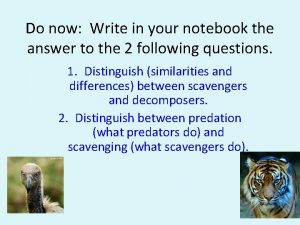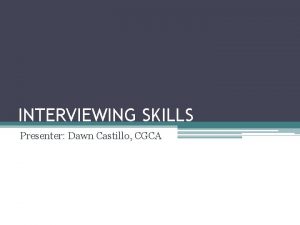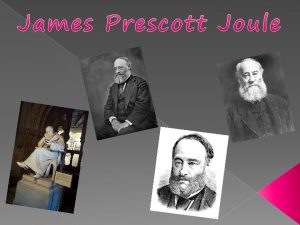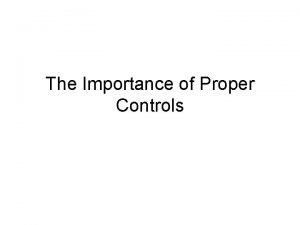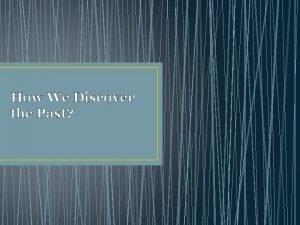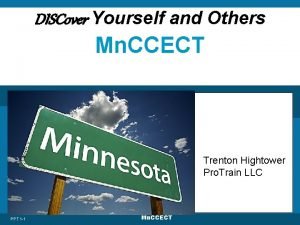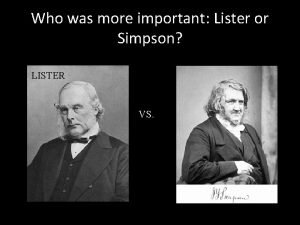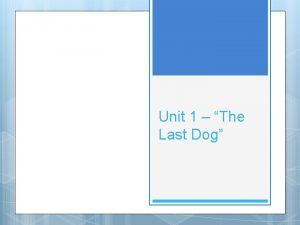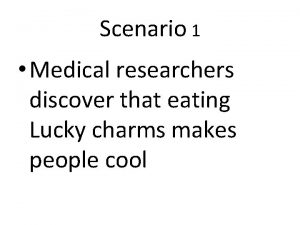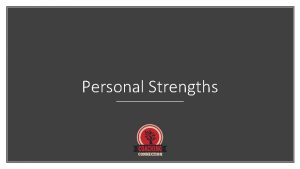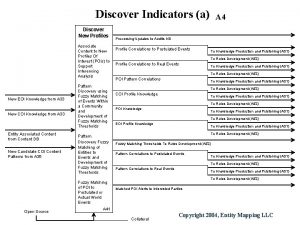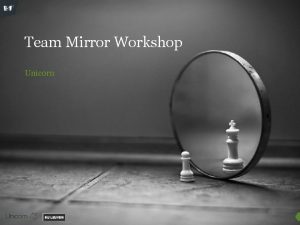Now Discover your Strengths Exploring the Individual Strengths








































































- Slides: 72

Now Discover your Strengths Exploring the Individual Strengths and Organizational Effectiveness Adapted from the book: Now, Discover your Strengths by Buckingham & Clifton. From "Now Discover Your Strengths" Chapter 4

Card Sorting Process • Review the 34 Strengths • 1 st sort – “Organizational Needs” – sort the cards into 3 separate piles of 11, 12, 11 with one pile being the strengths what are most critical to our organization, one pile with the least important, and one in the middle. • 2 nd Sort – “Personal Evaluation” – sort the cards as in 1 st sort but based on your strengths, your weaknesses, and those in the middle. • Review with the Group From "Now Discover Your Strengths" Chapter 4 2

34 Core Strengths • • • Achiever Activator Adaptability Analytical Arranger Belief Command Communication Competition Connectedness Context Deliberative • • • Developer Discipline Empathy Fairness Focus Futuristic Harmony Ideation Inclusiveness Individualization Input From "Now Discover Your Strengths" Chapter 4 • • Intellection Learner Maximizer Postitivity Relator Responsibility Restorative Self. Assurance • Significance • Strategic • Woo 3

Note: • You will notice that theme names are not all the same “type”. • Some refer to the person (e. g. , Achiever, Activator). • Some refer to the category (e. g. , Discipline, Empathy). • Others refer to the quality (e. g. , Adaptability, Analytical). • We chose this approach because attempts to standardize the type yielded increasingly clumsy and unfamiliar terms. From "Now Discover Your Strengths" Chapter 4 4

ACHIEVER Your Achiever theme helps explain your drive. Achiever describes a constant need for achievement. You feel as if every day starts at zero. By the end of the day you must achieve something tangible in order to feel good about yourself. And by "every day" you mean every single dayworkdays, weekends, vacations. No matter how much you may feel you deserve a day of rest, if the day passes without some form of achievement, no matter how small, you will feel dissatisfied. You have an internal fire burning inside you. It pushes you to do more, to achieve more. After each accomplishment is reached, the fire dwindles for a moment, but very soon it rekindles itself, forcing you toward the next accomplishment. Your relentless need for achievement might not be logical. It might not even be focused. But it will always be with you. As an Achiever you must learn to live with this whisper of discontent. It does have its benefits. It brings you the energy you need to work long hours without burning out. It is the jolt you can always count on to get you started on new tasks, new challenges. It is the power supply that causes you to set the pace and define the levels of productivity for your work group. It is theme that keeps you moving. From "Now Discover Your Strengths" Chapter 4 5

Achiever sounds like this: • • • Melanie K. , ER nurse: "I have to rack up points every day to feel successful. Today I've been here only half an hour, but I've probably racked up 30 points already. I ordered equipment for the BR, I had equipment repaired, I had a meeting with my charge nurse, I brainstormed with my secretary about improving our computerized logbook. Soon my list of ninety things I have thirty done already. I'm feeling pretty good about myself right now. " Ted S. , salesperson: "Last year I was salesperson of the year out of my company's three hundred salespeople. It felt good for a day, but sure enough, later that week it was as if it never happened. I was back at zero again. Sometimes I wish I wasn't be- cause it can lead me away from a balanced life toward obsession. I used to think I could change myself, but now I know I am just wired this way. This theme is truly a double-edged sword. It helps me achieve my goals, but on the other hand I wish I could just turn it off and on at will. But, hey, I can't. But I can manage it and avoid work obsession by focusing on achieving in all parts of my life, not just work. " Sara L. , writer: "This theme is a weird one. First, it's good because you live in pursuit of the perpetual challenge. But in the second place, you never feel as though you've reached your goal. It can keep you running uphill at seventy miles an hour for your whole life. You never rest because there's always more to do. But, on balance, I think I would rather have it than not. I call it my 'divine restlessness, ' and if it makes me feel as if I owe the present everything I have, then so be it. I can live with that. " From "Now Discover Your Strengths" Chapter 4 6

ACTIVATOR "When can we start? " This is a recurring question in your life. You are impatient for action. You may concede that analysis has its uses or that debate and discussion can occasionally yield some valuable insights, but deep down you know that only action is real. Only action can make things happen. Only action leads to performance. Once a decision is made, you cannot act. Others may worry that "there are still some things we don't know, " but this doesn't seem to slow you. If the decision has been made to go across town, you know that the fastest way to get there is to go stoplight to stoplight. You are not going to sit around waiting until all the lights have turned green. Besides, in your view, action and thinking are not opposites. In fact, guided by your Activator theme, you believe that action is the best device for learning. You make a decision, you take action, you look at the result, and you learn. This learning informs your next action and your next. How can you grow if you have nothing to react to? Well, you believe you can't. You must put yourself out there. You must take the next step. It is the only way to keep your thinking fresh and informed. The bottom line is this: You know you will be judged not by what you say, not by what you think, but by what you get done. This does not frighten you. It pleases you. From "Now Discover Your Strengths" Chapter 4 7

Activator sounds like this: • • Jane C. , Benedictine nun: "When I was prioress in the 1970 s, we were hit by the energy shortage and costs skyrocketed. We had 140 acres, and I walked the acreage every day pondering what we should do about this energy shortage. Suddenly I decided that if we had that much land, we should be drilling our own gas well, and so we did. We spent $100, 000 to drill a gas well. If you have never drilled a gas well, you probably don't realize what I didn't realize: namely, that you have to spend $70, 000 just to drill to see if you have any gas on your property at all. So they dug down with some kind of vibratory camera thing, and they told me that I had a gas pool. But they didn't know how large the pool was, and they didn't know if there was enough pressure to bring it up. . If you pay another $30, 000, we will try to release the well, ' they said. 'If you don't want us to, we'll just cap the well, take your $70, 000, and go home. ' So I gave them the final $30, 000 and, fortunately, up it came. That was twenty years ago, and it is still pumping. " Jim L. , entrepreneur: "Some people see my impatience as not wanting to listen to the traps, the potential roadblocks. What I keep repeating is 'I want to know when I am going to hit the wall, and I need you to tell me how much it is going to hurt. But if I choose to bump into the wall anyway, then, don't worry, you've done your job. I just had to experience it for myself. ' , . From "Now Discover Your Strengths" Chapter 4 8

ADAPTABILITY You live in the moment. You don't see the future as a fixed destination. Instead, you see it as a place that you create out of the choices that you make right now. And so you discover your future one choice at a time. This doesn't mean that you don't have plans. You probably do. But this theme of Adaptability does enable you to respond willingly to the demands of the moment even if they pull you away from your plans. Unlike some, you don't resent sudden requests or unforeseen detours. You expect them. They are inevitable. Indeed, on some level you actually look forward to them. You are, at heart, a very flexible person who can stay productive when the demands of work are pulling you in many different directions at once. From "Now Discover Your Strengths" Chapter 4 9

Adaptability sounds like this: • • • Marie T. , television producer: "I love live TV because you never know what is going to happen. One minute I might be putting together a segment on the best teenage holiday gifts, and the next I will be doing the pre-interview for a presidential candidate. I guess I have always been this way. I live in the moment. If someone asks me, 'What are you doing tomorrow? ' my answer is always 'Hell, I don't know. Depends what I am in the mood for. ' I drive my boyfriend crazy because he'll plan for us to go to the antique market on Sunday afternoon, and then right at the last minute I'll change my mind and say, 'Nah, let's go home and read the Sunday papers. ' Annoying, right? Yeah, but on the positive side, it does mean that I'm up for anything. " Linda G. , project manager: "Where I work lam the calmest person I know. When someone comes in and says, 'We didn't plan right. We need this turned around by tomorrow, ' my colleagues seem to tense up and freeze. Somehow that doesn't happen to me. I like that pressure, that need for instant response. It makes me feel alive. " Peter F. , corporate trainer: "I think I deal with life better than most people. Last week I found that my car window had been smashed and the stereo stolen. I was annoyed, of course, but it didn't throw me off my day one bit. I just cleared it, mentally moved on, and went right on with the other things I had to get done that day. " From "Now Discover Your Strengths" Chapter 4 10

ANALYTICAL Your Analytical theme challenges other people: "Prove it. Show me why what you are claiming is true. " In the face of this kind of questioning some will find that their brilliant theories wither and die. For you, this is precisely the point. You do not necessarily want to destroy other people's ideas, but you do insist that their theories b~ sound. You see yourself as objective and dispassionate. You like data because they are value free. They have no agenda. Armed with these data, you search for patterns and connections. You want to understand how certain patterns affect one another, How do they combine? What is their outcome? Does this outcome fit with theory being offered or the situation being confronted? These are your questions. You peel the layers back until, gradually, the root cause or causes are revealed. Others see you as logical and rigorous. Over time they will come to you in order to expose someone's "wishful thinking" or "clumsy thinking" to your refining mind. It is hoped that your analysis is never delivered too harshly. Otherwise, others may avoid you when that "wishful thinking" is their own. From "Now Discover Your Strengths" Chapter 4 11

Analytical sounds like this: • • • Jose G. , school system administrator: "I have an innate ability to see structure~ and formats and patterns before they exist. For instance, when people are talking about writing a grant proposal, while I'm listening to them my brain instinctively, processes the type of grants that are available and how the discussion fits into the eligibility, right down to the format of how the information can fit on the grant form in a clear and convincing way. “ Jack T. , human resources executive: "If I make a claim, I need to know that I can back it up with facts and logical thinking. For example, if someone says that our company is not paying as much as other companies, I always ask, 'Why do you say that? ' If they say, 'Well, I saw an ad in the paper that offers graduates in mechanical; engineering five grand more than we are paying, ' I'll reply by asking, 'But where are these graduates going to work? Is their salary based on geography? What types of companies are they going for? Are they manufacturing companies like ours? And how many people are in their sample? Is it three people, and one of them got a really good deal, thus driving the overall average up? ' There are many questions I need to ask to ensure that their claim is indeed a fact and not based on one misleading data point. " Leslie J. , school principal: "Many times there are inconsistencies in the performance of the same group of students from one year to the next. It's the same group of kids, but their scores are different year to year. How can this be? Which building are the kids in? How many of the kids have been enrolled for a full academic year? Which teachers were they assigned to, and what teaching styles were used by those teachers? I just love asking questions like these to understand what is truly happening. " From "Now Discover Your Strengths" Chapter 4 12

ARRANGER You are a conductor. When faced with a complex situation involving many factors, you enjoy managing all of the variables, aligning and realigning them until you are sure you have arranged them in the most productive configuration possible. In your mind there is nothing special about what you are doing. You are simply trying to figure out the best way to get things done. But others, lacking this theme, will be in awe of your ability. "How can you keep so many things in your head at once? " they will ask. "How can you stay so flexible, so willing to shelve well-laid plans in favor of some brand-new configuration that has just occurred to you? " But you cannot imagine behaving in any other way. You are a shining example of effective flexibility, whether you are changing travel schedules at the last minute because a better fare has popped up or mulling over just the right combination of people and resources to accomplish a new project. From the mundane to the complex, you are always looking for the perfect configuration. Of course, you are at your best in dynamic situations. Confronted with the unexpected, some complain that plans devised with such care cannot be changed, while others take refuge in the existing rules or procedures. You don't do either. Instead, you jump into the confusion, devising new options, hunting for new paths of least resistance, and figuring out new partnerships-because, after all, there might just be a better way. From "Now Discover Your Strengths" Chapter 4 13

Arranger sounds like this: • • • Sarah P. , finance executive: "I love really complicated challenges where I have to think on my feet and figure out how all the pieces fit together. Some people look at a situation, see thirty variables, and get hung up trying to balance all thirty. When I look at the same situation, I see about three options. And because I see only three, it's easier for me to make a decision and then put everything into place. " Grant D. , operations manager: "I got a message the other day from our manufacturing facility saying that demand for one of our products had greatly exceeded the forecast. I thought about it for a moment, and then an idea popped into my head: Ship the product weekly, not monthly. So I said, 'Let's contact our European subsidiaries, ask them what their demand is, tell them the situation we are in, and then ask what their weekly demand is. ' That way we can meet requirements without building up our inventory. Sure, it'll drive shipping costs up, but that's better than having too much inventory in one place and not enough in another. " Jane B. , entrepreneur: "Sometimes, for instance, when we are all going to a movie or a football game, this Arranger theme drives me up the wall. My family and friends come to rely on me-'Jane will get the tickets, Jane will organize the transportation. ' Why should I always have to do it? But they just say, 'Because you do it well. For us it would take half an hour. For you it seems to go much faster. You just call up the ticket place, order the right tickets, and just like that it's done. ” From "Now Discover Your Strengths" Chapter 4 14

BELIEF If you possess a strong Belief theme, you have certain core values that are enduring. These values vary from one person to another, but ordinarily your Belief theme causes you to be family-oriented, altruistic, even spiritual, and to value responsibility- and high ethics-both in yourself and others. These core values affect your behavior in many ways. They give your life meaning and satisfaction; in your view, success is more than money and prestige. They provide you with direction, guiding you through the temptations and distractions of life toward a consistent set of priorities. This consistency is the foundation for all your relationships. Your friends call you dependable. "I know where you stand, " they say. Your Belief makes you easy to trust. It also demands that you find work that meshes with your values. Your work must be meaningful, it must matter to you. And guided by your Belief theme it will matter only if it gives you a chance to live out your values. From "Now Discover Your Strengths" Chapter 4 15

Belief sounds like this: • Michael K. , salesperson: "The vast majority of my nonworking time goes to my family and to the things we do in the community. I was on the countywide Boy Scouts board of directors. And when I was a Boy Scout, I was pack leader. When I an Explorer, I was junior assistant leader for the Boy Scouts. I just like being with kids. I believe that's where the future is. And I think you can do a whole lot worse with your time than investing it in the future. " • Lara M. , college president: "My values are why I work so hard every day at my I put hours and hours into this job, and I don't even care what I get paid. I just found out that I am the lowest paid college president in my state, and I don't even care. I mean, I don't do this for the money. " • Tracy D. , airline executive: "If you are not doing something important, why bother? Getting up every day and working on ways to make flying safer seems important to me, purposeful. If I didn't find this purpose in my job, I don't know if I Id work through all the challenges and frustrations that get in my way. I think I would get demoralized. " From "Now Discover Your Strengths" Chapter 4 16

COMMAND Command leads you to take charge. Unlike some people, you feel no discomfort with imposing your views on others. On the contrary, once your opinion is formed, you need to share it with others. Once your goal is set, you feel restless until you have aligned others with you. You are not frightened by confrontation; rather, you know that confrontation is the first step toward resolution. Whereas others may avoid facing up to life's unpleasantness, you feel compelled to present the facts or the truth, no matter how unpleasant it may be. You need things to be clear between people and challenge them to be cleareyed and honest. You push them to take risks. You may even intimidate them. And while some may resent this, labeling you opinionated, they often willingly hand you the reins. People are drawn toward those who take a stance and ask them to move in a certain direction. Therefore, people will be drawn to you. You have presence. You have Command. From "Now Discover Your Strengths" Chapter 4 17

Command sounds like this: • • • Malcolm M. , hospitality manager: "One reason I affect people is that I am so candid. Actually, people say that I intimidate them at first. After I work with them a year, we talk about that sometimes. They say, 'Boy, Malcolm, when I started working here, I was scared to death. ' When I ask why, they say, 'I've never worked with anyone who just said it. Whatever it was, whatever needed to be said, you just said it. ' Rick P. , retail executive: "We have a wellness program whereby if you consume less than four alcoholic beverages a week, you get $25; if you don't smoke, you get $25 a month. So one day I got word that one of my store managers was smoking again. This was not good. He was smoking in the store, setting a bad example to the employees, and claiming his $25. I just can't keep stuff like that inside. It wasn't comfortable, but I confronted him with it immediately and clearly. 'Stop doing that, or you are fired. ' He's basically a good guy, but you can't let things like that slide by. " Diane N. , hospice worker: "I don't think of myself as 'assertive, but I do take charge. When you walk into a room with a dying person and his family, you have to take charge. They want you to take charge. They are a bit in shock, a bit frightened, a bit in denial. Basically, they're confused. They need someone to tell them what is going to happen next, what they can expect; that it's not going to be fun but that in some important ways it will be all right. They don't want mousy and soft. They want clarity and honesty. I provide it. " From "Now Discover Your Strengths" Chapter 4 18

COMMUNICATION You like to explain, to describe, to host, to speak in public, and to write. This is your Communication theme at work. Ideas are a dry beginning. Events are static. You feel a need to bring them to life, to energize them, to make them exciting and vivid. And so you turn events into stories and practice telling them. You take the dry idea and en- liven it with images and examples and metaphors. You believe that most people have a very short attention span. They are bombarded by information, but very little of it survives. You want your information-whether an idea, an event, a product's features and benefits, a discovery, or a lesson-to survive. You want to divert their attention toward you and then capture it, lock it in. This is what drives your hunt for the perfect phrase. This is what draws you toward dramatic words and powerful word combinations. This is why people like to listen to you. Your word pictures pique their interest, sharpen their world, and inspire them to act. From "Now Discover Your Strengths" Chapter 4 19

Communication sounds like this: • • • Sheila K. , general manager of a theme park: "Stories are the best way to make my point. Yesterday I wanted to show my executive committee the impact we can have on our guests, so I shared this story with them: One of our employees brought her father to the flag-raising ceremony we have for Veterans Day here at theme park. He was disabled during World War n, and he now has a rare form of cancer and; has had a lot of surgery. He's dying. At the start of the little ceremony one of our employees said to the group, 'This man is a World War II veteran. Can we give him a hand? ' Everybody cheered, and his daughter started crying. Her dad took off his hat! He never takes off his hat because of the scars on his head from the war and the cancer surgery, but when the national anthem started, he took off his hat and bowed his head. His daughter told me later that it was the best day he's had in years. “ Tom P. , banking executive: "My most recent client thought that the flow of capital toward internet stocks was just a passing phase. I tried using rational argument to change his mind, but he couldn't or wouldn't be convinced. In the end, as I often do when faced with a client in denial, I resorted to imagery. I told him that he was like a person sitting on a beach with his back to the sea. The Internet was like a fast-rising tide. No matter how comfortable he felt right now, the tide was rising with each crashing wave, and very soon one of those waves would come crashing down over his head and engulf him. He got the point. " Margret D. , marketing director: "I once read a book about giving speeches that gave two suggestions: talk only about things you're really passionate about and always use personal examples. I immediately started doing that, and I found lots of stories because I have kids and grandkids and a husband. I build my stories around my personal experiences because everyone can relate to them. " From "Now Discover Your Strengths" Chapter 4 20

COMPETITION Competition is rooted in comparison. When you look at the world, you are instinctively aware of other people's performance. Their performance is the ultimate yard- stick. No matter how hard you tried, no matter how worthy your intentions, if you reached your goal but did not outperform your peers, the achievement feels hollow. Like all competitors, you need other people. You need to compare. If you can compare, you can compete, and if you can compete, you can win. And when you win, there is no feeling quite like it. You like measurement because it facilitates comparisons. You like other competitors because they invigorate you. You like contests because they must produce a winner. You particularly like contests where you know you have the inside track to be the winner. Although you are gracious to your fellow competitors and even stoic in defeat, you don't compete for the fun of competing. You compete to win. Over time you will come to avoid contests where winning seems unlikely. From "Now Discover Your Strengths" Chapter 4 21

Competition sounds like this: • Mark L. , sales executive: "I've played sports my entire life, and I don't just play to have fun, let me put it that way. I like to engage in sports I am going to win and not ones I am going to lose because if I lose, I am outwardly gracious but inwardly infuriated. " • Harry D. , general manager: "I'm not a big sailor, but I love the America's Cup. Both boats are supposed to be exactly the same, and both crews are top-notch athletes. But you always get a winner. One of them had some secret up their sleeve that tipped the balance and enabled them to win more often than lose. And that's what I am looking for-that secret, that tiny edge. “ • Sumner Redstone, chairman of Viacom Corporation, on his acquisition of the television network CBS: "For me being number one was always a big thing. What I saw was that we'd have the number one cable network! The number one broadcast network! The number one outdoor-advertising company! The number one TV programming! Across the board-number ones!" From "Now Discover Your Strengths" Chapter 4 22

CONNECTEDNESS Things happen for a reason. You are sure of it because in your soul you know that we are all connected. Yes, we are individuals, responsible for our own judgments and in possession of our own free will, but nonetheless we are part of something larger. Some may call it the collective unconscious. Others may label it spirit or life force. But whatever your word of choice, you gain confidence from knowing that we are not isolated from one another or from the earth and the life on it. This feeling of Connectedness implies certain responsibilities. If we are all part of a larger picture, then we must not harm others because we will be harming ourselves! We must not exploit because we will be exploiting ourselves. Your awareness of these responsibilities creates your value system. You are considerate, caring, and accepting. Certain of the unity of humankind, you are a bridge builder for people of different cultures. Sensitive to the invisible hand, you can give others comfort that there is a purpose beyond our humdrum lives. The exact articles of your faith will depend on your upbringing and your culture, but your faith is strong. It sustains you and your close friends in the face of life's mysteries. From "Now Discover Your Strengths" Chapter 4 23

Connectedness sounds like this: • • • Mandy M. , homemaker: "Humility is the essence of Connectedness. You have to know who you are and who you aren't. I have a piece of the wisdom. I don't have much of it, but what I do have is real. This isn't grandiosity. This is real humility. You have confidence in your gifts, real confidence, but you know you don't have all the answers. You start to feel connected to others because you know they have wisdom that you don't. You can't feel connected if you think you have everything. " Rose T. , psychologist: "Sometimes I just look at my bowl of cereal in the morning and think about those hundreds of people who were involved in bringing me my bowl of cereal: the farmers in the field; the biochemists who made the pesticides; the warehouse workers at the food preparation plants; even the marketers who somehow, persuaded me to buy this box of cereal and not a different one sitting next to it on it shelf. I know it sounds strange, but I give thanks to these people, and just doing that makes me feel more involved with life, more connected to things, less alone. " Chuck M. , teacher: "In life I tend to be very black and white about things, but when it comes to understanding the mysteries of life, for some reason I am much more open. I have a big interest in learning about all different religions. I am reading a book right now that talks about Judaism versus Christianity versus the religion of the Canaanites. Buddhism, Greek mythology, it's really interesting how all of these tie together in some way. " From "Now Discover Your Strengths" Chapter 4 24

CONTEXT You look back because that is where the answers lie. You look back to understand the present. From your vantage point the present is unstable, a confusing clamor of competing voices. It is only by casting your mind back to an earlier time, a time when the plans were being drawn up, that the present regains its stability. The earlier time was a simpler time. It was a time of blueprints. As you look back, you begin to see these blueprints emerge. You realize what the initial intentions were. These blueprints or intentions have since become so embellished that they are almost unrecognizable, but now this Context theme reveals them again. This understanding brings you confidence. . No longer disoriented, you make better decisions because you sense the underlying structure. You become a better partner because you under- stand how your colleagues came to be who they are. And counter intuitively you become wiser about the future because you saw its seeds being sown in the past. Faced with new people and new situations, it will take you a little time to orient yourself, but you must give yourself this time. You must discipline yourself to ask the questions and allow the blueprints to emerge because no matter what the situation, if you haven't seen the blueprints, you will have less confidence in your decisions. From "Now Discover Your Strengths" Chapter 4 25

Context sounds like this: • • • Adam Y. , software designer: "I tell my people, 'Let's avoid vuja de. 'And they say, 'Isn't that the wrong word? Shouldn't it be deja vu? ' And I say, 'No, vuja de means that we're bound to repeat the mistakes of our past. We must avoid this. We must look to our past, see what led to our mistakes, and then not make them again. ' It sounds obvious, but most people don't look to their past or don't trust that it was valid or something. And so for them its vuja de all over again. " Jesse K. , media analyst: "I have very little empathy, so I don't relate to people through their present emotional state. Instead, I relate to them through their past. In fact, I can't even begin to understand people until I have found out where they grew up, who their parents were, what they studied at college. " Gregg H. , accounting manager. “I recently moved the whole office to a new accounting system, and the only reason it worked was that I honored their past. When people build an accounting system, it's their blood, their sweat and tears, it's them. They are personally identified with it. . So if I come in and blandly tell them that I'm going to change it, it's like me saying I am going to take your baby away. That's the level of emotion I was dealing with. I had to respect this connection, this history, or they would have rejected me out of hand. " From "Now Discover Your Strengths" Chapter 4 26

DELIBERATIVE You are careful. You are vigilant. You are a private person. You know that the world is an unpredictable place. Everything may seem in order, but beneath the surface you sense the many risks. Rather than denying these risks, you draw each one out into the open. Then each risk can be identified, assessed, and ultimately reduced. Thus, you are a fairly serious person who approaches life with a certain reserve. For example, you like to plan ahead so as to anticipate what might go wrong. You select your friends cautiously and keep your own counsel when the conversation turns to personal matters. You are careful not to give too much praise and recognition, lest it be misconstrued. If some people don't like you because you are not as effusive as others, then so be it. For you, life is not a popularity contest. Life is something of a mine- field. Others can run through it recklessly if they so choose, but you take a different approach. You identify the dangers, weigh their relative impact, and then place your feet deliberately. You walk with care. From "Now Discover Your Strengths" Chapter 4 27

Deliberative sounds like this: • • Dick H. , film producer: "My whole thing is to reduce the number of variables out there. The fewer the variables, the lower the risk. When I am negotiating with directors, I always start by giving in on some of the smaller points right away. Then once I have taken the smaller issues out of play, I feel better. I can focus. I can control the conversation. “ Debbie M. , project manager: "I am the practical one. When my colleagues are: spouting all of these wonderful ideas, I am asking questions like 'How is this going: to work? ' 'How is this going to be accepted by this group or that group of people? ' I won't say that I play devil's advocate because that is too negative, but I do weigh the implications and assess risk. And I think we all make better decisions because of my questions. " Jamie D. , service worker: "I am not a very organized person, but the one thing!, do without fail is double-check. I don't do it because I am hyper-responsible or anything. I do it to feel secure. With relationships, with performance, with anything, I’m out there on a limb, and I need to know that the particular branch I am standing on is solid. " Brian B. , school administrator: "I am putting together a safe schools plan. I am going to conferences, and we have eight committees working. We have a district-wide review board, but I am still not comfortable with the basic model. My boss asks, 'When can I see the plan? ' And I say, 'Not yet. I am not comfortable. ' She has big smile on her face and says, 'Gee, Brian, I don't want it to be perfect, I just want a plan. ' But she lets me be because she knows that the care I take now pays big dividends. Because of this prework, once the decision is made, it stays made. It doesn't unravel. " From "Now Discover Your Strengths" Chapter 4 28

DEVELOPER You see the potential in others. Very often, in fact, potential is all you see. In your view no individual is fully formed. On the contrary, each individual is a work in progress, alive with possibilities. And you are drawn toward people for this very reason. When you interact with others, your goal is to help them experience success. You look for ways to challenge them. You devise interesting experiences that can stretch them and help them grow. And all the while you are on the lookout for the signs of growth-a new behavior learned or modified, a slight improvement in a skill, a glimpse of excellence or of "flow" where previously there were only halting steps. For you these small increments-invisible to some are clear signs of potential being realized. These signs of growth in others are your fuel. They bring you strength and satisfaction. Over time many will seek you out for help and encouragement because on some level they know that your helpfulness is both genuine and fulfilling to you. From "Now Discover Your Strengths" Chapter 4 29

Developer sounds like this: • • • Marilyn K. , college president: "When it's graduation time and a nursing student walks across the stage, it's usually a woman around thirty-five, She gets her diploma, and about eighteen rows back some little kid is standing on a chair with a group yelling, 'Yeah, Mom!' I love that, I cry every time, " John M. , advertising executive: "I'm not a lawyer, doctor, or candlestick maker, My skills are of a different type, They have to do with understanding people and motives, and the pleasure I get is from watching people discover themselves in ways they never thought possible and from finding people who bring talents to the table that I don't have. " Anna G. , nurse: "I had a patient, a young woman, with lung damage so bad that she will have to be on oxygen forever, She will never have the energy or the strength to live a normal life, and I walk in and she's desperate, She doesn't know if she is short of breath because she is anxious, or anxious because she is short of breath. And she's talking suicide because she can't work, can't support her husband, So I got her thinking about what she could do rather than what she couldn't, It turns out that she is very creative with arts and crafts, so I told her, 'Look, there are things you can do, and if those things bring you pleasure, then do them, It's a place to start, ' And she cried and said, 'I have the energy to wash only one bowl, ' I said, 'That's today, To- morrow you can wash two. ' And by Christmas time she was making all kinds of things and selling them, too, " From "Now Discover Your Strengths" Chapter 4 30

DISCIPLINE Your world needs to be predictable. It needs to be ordered and planned. So you instinctively impose structure on your world. You set up routines. You focus on time- lines and deadlines. You break longterm projects into a series of specific short-term plans, and you work through each plan diligently. You are not necessarily neat and clean, but you do need precision. Paced with the inherent messiness of life, you want to feel in control. The routines, the timelines, the structure, all of these help create this feeling of control. Lacking this theme of Discipline others may sometimes resent your need for order, but there need not be conflict. You must understand that not everyone feels your urge for predictability; they have other ways of getting things done. Likewise, you can help them understand even appreciate your need for structure. Your dislike of surprises, your impatience with errors, your routines, and your detail orientation don't need to be misinterpreted as controlling behaviors that box people in. Rather, these behaviors can be understood as your instinctive method for maintaining your progress and your productivity in the face of life's many distractions. From "Now Discover Your Strengths" Chapter 4 31

Discipline sounds like this: • • • Les T. , hospitality manager: "The turning point in my career was attending one of those time-management courses some years back. I was always disciplined, but the power grew when. I learned how to use that discipline in an organized process every day. This little Palm Pilot means that I call my mom every Sunday rather than; letting months go by without calling. It means I take my wife out for dinner every week without her asking. It means that my employees know that if I say I need to see something on Monday, I will be calling on Monday if I haven't seen it. This Palm Pilot is so much a part of my life that I have lengthened all of my pants' pockets so that it fits right there on my hip. “ Troy T. , sales executive: "My filing system may not look that pretty, but it is very efficient. I handwrite everything because I know that no customer is going to see these files, so why waste time making them look pretty? My whole life as a salesperson is based on deadlines and follow-up. In my system I keep track of everything so that I take responsibility not only for my deadlines and follow-up but for all of my customers' and colleagues' as well. If they haven't gotten back to me by the time they promised, they're going to receive an e-mail from me. In fact, I heard from one the other day who said, 'I may as well get back to you because I know you're going to voice-mail me if you haven't heard from me. ‘ Diedre S. , office manager: "I hate wasting time, so I make lists, long lists that keep me on track. Today my list has ninety items on it, and I will get through 95 percent of them. And that's discipline because I don't let anybody waste my time. I am, not rude, but I can let you know in a very tactful, humorous way that your time is up. " From "Now Discover Your Strengths" Chapter 4 32

EMPATHY You can sense the emotions of those around you. You can feel what they are feeling as though their feelings are your own. Intuitively, you are able to see the world through their eyes and share their perspective. You do Dot necessarily agree with each person's perspective. You do not necessarily feel pity for each person's predicament-this would be sympathy, not empathy. You do not necessarily condone the choices each person makes, but you do understand. This instinctive ability to understand is powerful. You hear the unvoiced questions. You anticipate the need. Where others grapple for words, you seem to find the right words and the right tone. You help people find the right phrases to express their feelings-to themselves as well as to others. You help them give voice to their emotional life. For all these reasons other people are drawn to you. From "Now Discover Your Strengths" Chapter 4 33

Empathy sounds like this: • • • Alyce J. , administrator: "Recently, I was in a meeting of trustees where one of the individuals was presenting anew idea that was critical to her and to the life of this group. When she was finished, no one heard her opinion, no one really heard her. It was a powerfully demoralizing moment for her. I could see it in her face, and she wasn't herself for a day or two afterward. I finally raised the issue with her and used words that helped describe how she was feeling. I said, 'Something's wrong, ' and she started to talk. I said, 'I really understand. I know how important this was for you, and you don't seem like yourself, ' and so on. And she finally gave words to what was going on inside her. She said, 'You're the only one who heard me and who has said one word to me about it. ' Brian H. , administrator: "When my team is making decisions, what I like to do is say, 'Okay, what will this person say about this? ' 'What will that person say about it? ' In other words, put yourself in their position. Let's think about the arguments from their perspective so that we can all be more persuasive. “ Janet P. , schoolteacher: "I never played basketball because they didn't have it for women when I was a kid, but I believe I can tell at a basketball game when the momentum is changing, and I want to go to the coach and say, 'Get them revved up. You are losing them. . Empathy also works in large groups; you can feel the crowd. " From "Now Discover Your Strengths" Chapter 4 34

FAIRNESS Balance is important to you. You are keenly aware of the need to treat people the same, no matter what their station in life, so you do not want to see the scales tipped too far in anyone person's favor. In your view this leads to selfishness and individualism. It leads to a world where some people gain an unfair advantage because of their connections or their background or their greasing of the wheels. This is truly offensive to you. You see yourself as a guardian against it. In direct contrast to this world of special favors, you believe that people function best in a consistent environment where the rules are clear and are applied to everyone equally. This is an environment where people know what is expected. It is predictable and evenhanded. It is fair. Here each person has an even chance to show his or her worth. From "Now Discover Your Strengths" Chapter 4 35

Fairness sounds like this: • • • Simon H. , general manager of a hotel: "I often remind my senior managers that they shouldn't be abusing their parking privileges or using their position to take golf tee times when there are guests waiting. They hate my drawing attention to this, but I am just the kind of person who dislikes people abusing their perks. I also spend a great deal of time with our hourly employees. I have tremendous respect for them. In fact, as I told my managers, the lower people are on the totem pole, the better I treat them. " Jamie K. , magazine editor: "I am the person who always roots for the underdog. I hate it when people don't get a fair shot because of some circumstance in their life that they couldn't control. To put some teeth to this, I am going to set up a scholarship at my alma mater so that journalism students of limited means can do internships in the real world without having to keep paying for their college tuition. I was lucky. When I was an intern in New York at NBC, my family could afford it. Some families can't, but those students should still get a fair shot. " Ben F. , operations manager: "Always give credit where credit is due, that's my motto. If I am in a meeting and I bring up an idea that one of my staff actually came up with, I make sure to publicly attribute the idea to that person. Why? Because my bosses always did that with me, and now it seems like the only fair and proper thing to do. " From "Now Discover Your Strengths" Chapter 4 36

FOCUS "Where am I headed? " you ask yourself. You ask this question every day. Guided by this theme of Focus, you need a clear destination. Lacking one, your life and your work can quickly become frustrating. And so each year, each month, and even each week you set goals. These goals then serve as your compass, helping you determine priorities and make the necessary corrections to get back on course. Your Focus is powerful because it forces you to filter; you instinctively evaluate whether or not a particular action will help you move toward your goal. Those that don't are ignored. In the end, then, your Focus forces you to be efficient. Naturally, the flip side of this is that it causes you to become impatient with delays, obstacles, and even tangents, no matter how intriguing they appear to be. This makes you an extremely valuable team member. When others start to wander down other avenues, you bring them back to the main road. Your Focus reminds everyone that if something is not helping you move toward your destination, then it is not important. And if it is not important, then it is not worth your time. You keep everyone on point. From "Now Discover Your Strengths" Chapter 4 37

Focus sounds like this: • • Nick H. , computer executive: "It is very important to me to be efficient. I'm the sort of guy who plays a round of golf in two and a half hours. When I was at Electronic Data Systems, I worked out a set list of questions so that I could conduct a re- view of each division in fifteen minutes. The founder, Ross Perot, called me 'The Dentist' because I would schedule a whole day of these in-andout, fifteen minute meetings. " Brad F. , sales executive: "I am always sorting priorities, trying to figure out the most efficient route toward the goal so that there is very little dead time, very little wasted motion. For example, I will get multiple calls from customers who need me to call the service department for them, and rather than taking each one of these calls as they come and interrupting the priorities of the day, I group them together into one call at the end of the day and get it done. " Mike L. , administrator: "People are amazed how I put things into perspective and stay on track. When people around the district are stuck on issues and caught on contrived barriers, I am able to pole-vault over them, reestablish the focus, and keep things moving. " Doriane L. , homemaker: "I am just the kind of person who likes to get to the point-in conversations, at work, and even when I am shopping with my husband. He likes to try on lots of things and has a good time doing it, whereas I try one thing on, and if I like it and it is not horribly priced, I buy it. I'm a surgical shopper. " From "Now Discover Your Strengths" Chapter 4 38

FUTURISTIC "Wouldn't it be great if. . . " You are the kind of person who loves to peer over the horizon. The future fascinates you. As if it were projected on the wall, you see in de~: tail what the future might hold, and this detailed picture keeps pulling you forward, into tomorrow. While the exact content of the picture will depend on your other strengths and interests-a better product, a better team, a better life, or a better world-it will always be inspirational to you. You are a dreamer who sees visions of what could be and who cherishes those visions. When the present proves too frustrating and the people around you too pragmatic, you conjure up your visions of the future and they energize you. They can energize others, too. In fact, very often people look to you to describe your visions of the future. They want a picture that can raise their sights and thereby their spirits. You can paint it for them. Practice. Choose your words carefully. Make the picture as vivid as possible. People will want to latch on to the hope you bring. From "Now Discover Your Strengths" Chapter 4 39

Futuristic sounds like this: • • Dan F. , school administrator: "In any situation I am the guy who says 'Did you ever think about ? I wonder if we could. . I don't believe it can't be done. It's just that nobody has done it yet. Let's figure out how we can. ' I am always looking for options, for ways not to be mired by the status quo. In fact, there is no such thing as the status quo. You are either moving forward, or you are moving backward, That's the reality of life, at least from my perspective. And right now I believe that my profession is moving backward. State schools are being out-serviced by private schools, charter schools, home schools, Internet schools. We need to free ourselves from our traditions and create a new future. " Dr. Jan K. , internist: "Here at the Mayo Clinic we are launching a group called the Hospitalists. Rather than having patients handed off from one doctor to another, during their stay in the hospital, I envision a family of providers. I envision fifteen to' twenty MDs, of various genders and races, with twenty to twenty-five nurse practitioners. There will be four to five new hospital services, most of which will work with surgeons and will provide paraoperative care as well as care for the hospitalized elderly. We are redefining the model of care here. We don't just take care of the patients when they are in the hospital. If a patient comes in for a knee replacement, a member of the Hospitalist team would see him before the surgery, follow him from the day of surgery through the days of hospitalization, and then see him when he comes in six weeks later for his postoperative check. We will provide patients with a complete episode of care so that they don't get lost in the handoffs. And to get the funding I just saw the detailed picture in my head and kept describing this picture to the department chair. I guess I made it seem so real that they had no choice but to grant me the funds. " From "Now Discover Your Strengths" Chapter 4 40

HARMONY You look for areas of agreement. In your view there is little to be gained from conflict and friction, so you seek to hold them to a minimum. When you know that the people around you hold differing views, you try to find the common ground. You try to steer them away from confrontation and toward harmony. In fact, harmony is one of your guiding values. You can't quite believe how much time is wasted by people trying to impose their views on others. Wouldn't we all be more productive if we kept our opinions in check and instead looked for consensus and support? You believe we would, and you live by that belief. When others are sounding off about their goals, their claims, and their fervently held opinions, you hold your peace, When others strike out in a direction, you willingly, in the service of harmony, modify your own objectives to merge with theirs (as long as their basic values do not clash with yours). When others start to argue about their pet theory or concept, you steer clear of the debate, preferring to talk about practical, down-to-earth matters on which you can all agree. In your view we are all in the same boat, and we need this boat to get where we are going. It is a good boat. There is no need to rock it just to show that you can. From "Now Discover Your Strengths" Chapter 4 41

Harmony sounds like this: • Jane C. , Benedictine nun: "I like people. I relate to them easily because I am very strong in adjustment. I take the shape of the vessel into which I am poured, so I don't irritate easily. " • Chuck M. , teacher: "I don't like conflict in class, but I have learned to let things run their course instead of trying to stop it right away. When I first started teaching, if someone said something negative, I would think, 'Oh, why did you have to say that? ' and try to get rid of it right away. But now I simply try to get the opinion of someone else in the class so that perhaps we can have different points of view on the same topic. " • Tom P. , technician: "I can remember vividly when I was ten or eleven and some of the kids in my school would get into arguments. For some reason I would feel compelled to get in the middle of things and find the common ground. I was the peacemaker. " From "Now Discover Your Strengths" Chapter 4 42

IDEATION You are fascinated by ideas. What is an idea? An idea is a concept, the best explanation of the most events. You are delighted when you discover beneath the complex ice an elegantly simple concept to explain why things are the way they are. An idea is a connection. Yours is the kind of mind that is always looking for connections, so you are intrigued when seemingly disparate phenomena can be linked by an obscure connection. An idea is a new perspective on familiar challenges. You revel in taking the world we all know and turning it around so we can view it from a strange but strangely enlightening angle. You love all these ideas because they are profound, because they are novel, because they are clarifying, because they are contrary, because they are bizarre. For all these reasons you derive a jolt of energy whenever an idea occurs to you. Others may label you creative or original or conceptual or smart. Perhaps you are all of these. Who can be sure? What you are sure of is that ideas are thrilling. And on most days this is enough. From "Now Discover Your Strengths" Chapter 4 43

Ideation sounds like this: • • Mark B. , writer: "My mind works by finding connections between things. The day I was hunting down the Mona Lisa in the Louvre museum. I turned a corner and I was blinded by the flashing of a thousand cameras snapping the tiny picture. For some reason I stored that visual image away. Then I noticed a NO FLASH PHOTOGRAPHY sign, and I stored that away, too. I thought it was odd because I remembered reading that flash photography can harm paintings. Then about six months I read that the Mona Lisa has been stolen at least twice in this century. And suddenly I put it all together. The only explanation for all these facts is that the real Mona Lisa not on display in the Louvre. The real Mona Lisa has been stolen, and the museum is afraid to admit their carelessness, has installed a fake. I don't know if it's true, of course, but what a great story. " Andrea H. , interior designer: "I have the kind of mind where everything has to ether or I start to feel very odd. For me, every piece of furniture represents an idea. It serves a discrete function both independently and in concert with every other The 'idea' of each piece is so powerful in mind, it must be obeyed. If I am sit- t a room where the chairs are somehow not fulfilling their discrete functionthey’re the wrong kind of chairs or they're facing the wrong way or they're pushed up too close to the coffee table-I find myself getting physically uncomfortable and mentally distracted. Later, I won't be able to get it out of my mind. I'll find myself awake at 3: 00 A. M. , and I walk through the person's house in my mind's eye, rearranging the furniture and repainting the walls. This started happening when I was very young, say seven years old. " From "Now Discover Your Strengths" Chapter 4 44

INCLUSIVENESS "Stretch the circle wider. " This is the philosophy around which you orient your life. You want to include people and make them feel part of the group. In direct contrast to those who are drawn only to exclusive groups, you actively avoid those groups that exclude others. You want to expand the group so that as many people as possible can benefit from its support. You hate the sight of someone on the outside looking in. You want to draw them in so that they can feel the warmth of the group. You are an instinctively accepting person. Regardless of race or sex or nationality or personality or faith, you cast few judgments. Judgments can hurt a person's feelings. Why do that if you don't have to? Your accepting nature does not necessarily rest on a belief that each of us is different and that one should respect these differences. Rather, it rests on your conviction that fundamentally we are all the same. We are all equally important. Thus, no one should be ignored. Each of us should be included. It is the least we all deserve. From "Now Discover Your Strengths" Chapter 4 45

Inclusiveness sounds like this: • • • Harry D. , outplacement consultant: "Even as a child, although I was very shy, I always made sure that I was the one inviting others to play. When picking teams or sides in school, I never wanted anyone not to participate with us. In fact, I can re- member when I was ten or eleven, I had a friend who was not a member of our church-he was a Catholic. We were at a church banquet, and he showed up at the door because typically we had our youth activity on that night. Immediately, I got up, brought him over to our family, and sat him down at the table. " Jeremy D. , defense lawyer: "When I first started this job, I met people and be- came fast, furious friends with them almost on day one, only to find out later that, you know, this person's got a lot of issues, and I've already included them in dinner parties and our social circle. My partner, Mark, is like 'What is it exactly that made you want to include this person? ' And then it's a matter of figuring out what pushed my buttons when I first met them, that made me enjoy them so much. And, you know, making sure that this is the aspect of them that Mark and I focus on because once I include someone in my circle, I don't, you know, dump them. " Giles D. , corporate trainer: "In class I seem to be able to sense when someone is disengaging from the group discussion, and I immediately draw them back into the conversation. Last week we got into a lengthy discussion about performance appraisals, and one woman wasn't talking at all. So I just said, 'Monica, you've had performance appraisals. Any thoughts on the subject? ' I really think this has helped me as a teacher because when I don't know the answer to something, very often it is the person I pull in who supplies the answer for me. " From "Now Discover Your Strengths" Chapter 4 46

INDIVIDUALIZATION Your Individualization theme leads you to be intrigued by the unique qualities of each person. You are impatient with generalizations or "types" because you don't want to obscure what is special and distinct about each person. Instead, you focus on the differences between individuals. You instinctively observe each person's style, each person's motivation, how each thinks, and how each builds relationships. You hear the one-of-a-kind stories in each person's life. This theme explains why you pick your friends just the right birthday gift, why you know that one person prefers praise in public and another detests it, and why you tailor your teaching style to accommodate one person's need to be shown and another's desire to "figure it out as I go. " Because you are such a keen observer of other people's strengths, you can draw out the best in each person. This Individualization theme also helps you build productive teams. While some search around for the perfect team "structure" or "process, " you know instinctively that the secret to great teams is casting by individual strengths so that everyone can do a lot of what they do well. From "Now Discover Your Strengths" Chapter 4 47

Individualization sounds like this: • • Les T. , hospitality manager: "Carl is one of our best performers, but he still has to see me every week. He just wants that little encouragement and checking in, and he gets fired up a little bit after that meeting. Whereas Greg doesn't like to meet very often, so there's no need for me to bother him. And when we do meet, it's really for me, not for him. " Marsha D. , publishing executive: "Sometimes I would walk out of my office and-you know how cartoon characters have those balloons over their head? '--I would see these little balloons over everyone's head telling me what was in their mind. It sounds weird, doesn't it, but it happens all the time. " Giles G. , sales manager: "I'm fairly new to this role, but very early on I can remember a particular meeting when we got stuck on one subject and kept going around. I got frustrated and suddenly thought, 'These people have never seen me get angry. Let me throw this out and see how each one reacts to it. ' So I got angry, and it was interesting to see how certain people accepted it, some took it as a challenge, and others went into a big shell. Each one's reactions told me something useful about them, something I could use moving forward. " Andrea H. , interior designer: "When you ask people what their style is, they find it hard to describe, so I just ask them, 'What is your favorite spot in the house? ' And when I ask that, their faces light up, and they know just where to take me. From that one spot I can begin to piece together the kind of people they are and what their style is. " From "Now Discover Your Strengths" Chapter 4 48

INPUT You are inquisitive. You collect things. You might collect informationwords, facts, books, and quotations-or you might collect tangible objects such as butterflies, baseball cards, porcelain dolls, or sepia photographs. Whatever you collect, you collect it because it interests you. And yours is the kind of mind that finds so many things interesting. The world is exciting precisely because of its infinite variety and complexity. If you read a great deal, it is not necessarily to refine your theories but, rather, to add more information to your archives. If you like to travel, it is because each new location offers novel artifacts and facts. These can be acquired and then stored away. Why are they worth storing? At the time of storing it is often hard to say exactly when or why you might need them, but who knows when they might become useful? With all those possible uses in mind, you really don't feel comfortable throwing anything away. So you keep acquiring and compiling and filing stuff away. It's interesting. It keeps your mind fresh. And perhaps one day some of it will prove valuable. From "Now Discover Your Strengths" Chapter 4 49

Input sounds like this: • • • Ellen K. , writer: "Even as a child I found myself wanting to know everything. I would make a game of my questions. 'What is my question today? ' I would think up these outrageous questions, and then I would go looking for the books that would answer them. I often got way over my head, deep into books that I didn't have a clue about, but I read them because they had my answer someplace. My questions be- came my tool for leading me from one piece of information to another. " John F. , human resources executive: "I'm one of those people who think that the Internet is the greatest thing since sliced bread. I used to feel so frustrated, but now if I want to know what the stock market is doing in a certain area or the rules of a certain game or what the GNP of Spain is or other different things, I just go to the computer, start looking, and eventually find it. " Kevin F. , salesperson: "I'm amazed at some of the garbage that collects in my mind, and I love playing Jeopardy and Trivial Pursuit and anything like that. I don't mind throwing things away as long as they're material things, but I hate wasting knowledge or accumulated knowledge or not being able to read something fully if I enjoy it. " From "Now Discover Your Strengths" Chapter 4 50

INTELLECTION You like to think. You like mental activity. You like exercising the "muscles" of your I, stretching them in multiple directions. This need for mental activity may be focused; for example, you may be trying to solve a problem or develop an idea or understand another person's feelings. The exact focus will depend on your other strengths. On the other hand, this mental activity may very well lack focus. The theme of Intellection does not dictate what you are thinking about; it simply describes that you like to think. You are the kind of person who enjoys your time alone use it is your time for musing and reflection. You are introspective. In a sense you are your own best companion, as you pose yourself questions and try out answers on yourself to see how they sound. This introspection may lead you to a slight sense of discontent as you compare what you are actually doing with all the thoughts and ideas that your mind conceives. Or this introspection may tend toward more pragmatic matters such as the events of the day or a conversation that you plan to later. Wherever it leads you, this mental hum is one of the constants of your life. From "Now Discover Your Strengths" Chapter 4 51

Intellection sounds like this: • • • Lauren H. , project manager: "I suppose that most people who meet me in passing presume that I am a flaming extrovert. I do not deny the fact that I love people, but they would be amazed to know how much time alone, how much solitude I need in order to function in public. I really love my own company. I love solitude because it gives me a chance to allow my diffused focus to simmer with something else. That’s where my best ideas come from. My ideas need to simmer and 'perk. ' I used this phrase even when I was younger; 'I have put my ideas in, and now I have to wait for them to perk. ' Michael P. , marketing executive: "It's strange, but I find that I need to have noise around me or I can't concentrate. I need to have parts of my brain occupied; otherwise it goes so fast in so many directions that I don't get anything done. If I can occupy my brain with the TV or my kids running around, then I find I concentrate even better. “ Jorge H. , factory manager and former political prisoner: "We used to get put into solitary confinement as a punishment, but I never hated it as the others did. You might think that you would get lonely, but I never did. I used the time to reflect on my life and sort out the kind of man I was and what was really important to me, my family, my values. In a weird way solitary actually calmed me down and made me stronger. " From "Now Discover Your Strengths" Chapter 4 52

LEARNER You love to learn. The subject matter that interests you most will be determined by your other themes and experiences, but whatever the subject, you will always be drawn to the process of learning. The process, more than the content or the result, is especially exciting for you. You are energized by the steady and deliberate journey from ignorance to competence. The thrill of the first few facts, the early efforts to re- cite or practice what you have learned, the growing confidence of a skill mastered- this is the process that entices you. Your excitement leads you to engage in adult learning experiencesyoga or piano lessons or graduate classes. It enables you to thrive in dynamic work environments where you are asked to take on short project assignments and are expected to learn a lot about the new subject matter in a short period of time and then move on to the next one. This Learner theme does not necessarily mean that you seek to become the subject matter expert, or that you are striving for the respect that accompanies a professional or academic credential. The outcome of the learning is less significant than the "getting there. " From "Now Discover Your Strengths" Chapter 4 53

Learner sounds like this: • • • Annie M. , managing editor: "I get antsy when I am not learning something. Last year, although I was enjoying my work, I didn't feel as though I was learning enough, So I took up tap dancing. It sounds strange, doesn't it? I know I am never going to perform or anything, but I enjoy focusing on the technical skill of tapping, getting a little better each week, and moving up from the beginners' class to the intermediate class. That was a kick, " Miles A. , operations manager: "When I was seven years old, my teachers would tell my parents, 'Miles isn't the most intelligent boy in the school, but he's a sponge for learning and he'll probably go really far because he will push himself and continually be grasping new things. ' Right now I am just starting a course in business travel Spanish, I know it is probably too ambitious to think I could learn conversational Spanish and become totally proficient in that language, but I at least want to be able to travel there and know the language. " Tim S. , coach for executives: "One of my clients is so inquisitive that it drives him crazy because he can't do everything he wants to. I'm different, I am not curious in that broad sense, I prefer to go into greater depth with things so that I can become competent in them and then use them at work. For example, recently one of my clients wanted me to travel with him to Nice, France, for a business engagement, so I started reading up on the region, buying books, checking the Internet, It was all interesting and I enjoyed the study, but I wouldn't have done any of it if I wasn't going to be traveling there for work. " From "Now Discover Your Strengths" Chapter 4 54

MAXIMIZER Excellence, not average, is your measure. Taking something from below average to slightly above average takes a great deal of effort and in your opinion is not very re- warding. Transforming something strong into something superb takes just as much effort but is much more thrilling. Strengths, whether yours or someone else's, fascinate you. Like a diver after pearls, you search them out, watching for the telltale signs of a strength. . A glimpse of untutored excellence, rapid learning, a skill mastered without recourse to steps-all these are clues that a strength may be in play. And having found a strength, you feel compelled to nurture it, refine it, and stretch it toward excellence. You polish the pearl until it shines. This natural sorting of strengths means that others see you as discriminating. You choose to spend time with people who appreciate your particular strengths. Likewise, you are attracted to others who seem to have found and cultivated their own strengths. You tend to avoid those who want to fix you and make you well rounded. You don't want to spend your life bemoaning what you lack. Rather, you want to capitalize on the gifts with which you are blessed. It's more fun. It's more productive. And, counter-intuitively, it is more demanding. From "Now Discover Your Strengths" Chapter 4 55

Maximizer sounds like this: • • • Gavin T. , flight attendant: "I taught aerobics for ten years, and I made a point of; asking people to focus on what they liked about themselves. We all have parts of our body that we would like to change or that we would like to see differently, but to focus on that can be so destructive. It becomes a vicious cycle. So I would say, 'Look, you don't need to be doing that. Instead, let's focus on the attribute you like about yourself, and then we'll all feel better about expending all of this energy. ' " Amy T. , magazine editor: "There is nothing I hate more than having to fix a poorly written piece. If I have given the writer a clear focus and she comes back with a piece that is completely off the mark, I almost can't bring myself to write comments on it. I'm more inclined to just hand it back to her and say, 'Just please start again. ' On the other hand, what I love to do is take a piece that is so close and then refine it to make it perfect. You know, just the right word here, a little cut there, and suddenly it's a brilliant piece. " Marshall G. , marketing executive: "I am really good at setting a focus for people and then building a sense of team spirit as we all march forward. But I am not so good at strategic thinking. Fortunately, I have a boss who understands that about me, ) We have been working together for quite a few years. He has found people who play; the strategic role and at the same time stretched me to be even better at the focus and team -building role. I'm so lucky to have a boss who thinks this way. It's made me more secure and made me charge ahead much faster, knowing that my boss knows!, what I am good at and what I'm not good at; he doesn't bother me with the latter. '!! From "Now Discover Your Strengths" Chapter 4 56

POSITIVITY You are generous with praise, quick to smile, and always on the lookout for the positive in the situation. Some call you lighthearted. Others just wish that their glass were as full as yours seems to be. But either way, people want to be around you. Their world looks better around you because your enthusiasm is contagious. Lacking your energy and optimism, some find their world drab with repetition or, worse, heavy with pressure. You seem to find a way to lighten their spirit. You inject drama into every project. You celebrate every achievement. You find ways to make everything more exciting and more vital. Some cynics may reject your energy, but you are rarely dragged down. Your Positivity won't allow it. Somehow you can't quite escape your conviction that it is good to be alive, that work can be fun, and that no matter what the setbacks, one must never lose one's sense of humor. From "Now Discover Your Strengths" Chapter 4 57

Positivity sounds like this: • • • Gerry L. , flight attendant: "There are so many people on an airplane that I have made it a point over the years of singling out one or two on a flight and making it something special for them. Certainly, I will be courteous to everybody and extend to them the kind of professionalism that I would like given to me, but over and above that I try to make one person or family or small group of people feel particularly special, with jokes and conversation and little games that I play. " Andy B. , Internet marketing executive: "I am one of those people who loves creating buzz. I read magazines all the time, and if I find something fun-some new store, new: lip gloss, whatever-I will charge around telling everyone about it. 'Oh, you just have to try this store. It is so-o-o cool. Look at these pictures. Check them out, ' I am so passionate when I talk about something that people just have to do what I say. It's not that I am a great salesperson. I'm not. In fact, I hate asking for the close, I hate bothering people. It's just that my passion about what I say makes people think, 'Gosh, it must be true. ' Sunny G. , communications manager: "I think the world is plagued with enough negative people. We need more positive people, people who like to zero in on what is right with the world, Negative people just make me feel heavy. In my last job there was a guy who came into my office every morning just to unload on me. I would purposely dodge him. I'd see him coming, and I'd run to the bathroom or go some other place. He made me feel as if the world was a miserable place, and I hated that. " From "Now Discover Your Strengths" Chapter 4 58

RELATOR Relator describes your attitude toward your relationships. In simple terms, the Relator theme pulls you toward people you already know. You do not necessarily shy away from meeting new people-in fact, you may have other themes that cause you to enjoy the thrill of turning strangers into friends-but you do derive a great deal of pleasure and strength from being around your close friends. You are comfortable with intimacy. Once the initial connection has been made, you deliberately encourage a deepening of the relationship. You want to understand their feelings, their goals, their fears, and their dreams; and you want them to understand yours. You know that this kind of closeness implies a certain amount of risk-you might be taken advantage of-but you are willing to accept that risk. For you a relationship has value only if it is genuine. And the only way to know that is to entrust yourself to the other person. The more you share with each other, the more you risk together. The more you risk together, the more each of you proves your caring is genuine. These are your steps toward real friendship, and you take them willingly. From "Now Discover Your Strengths" Chapter 4 59

Relator sounds like this: • • • Tony D. , pilot: "I used to fly in the Marines, and, boy, you had better be comfort- able with the word 'friend' in the Marines. You had better feel good about trusting someone else. I can't tell you how many times I put my life in someone else's hands. I was flying off his wing, and I'd be dead if my friend couldn't get me back safely. " Jamie T. , entrepreneur: "I'm definitely selective about my relationships. Initially, when I first meet people, I don't want to give them very much of my time. I don't know them, they don't know me, so let's just be pleasant and leave it at that. But if circumstances make it so that we get to know each other better, it seems like a threshold is reached where I suddenly start wanting to invest more. I'll share more of myself, put myself out for them, do things for them that will bring us a little closer together and show that I care. It's funny because I am not looking for any more friends in my life. I have enough. And yet with each new person I meet, as soon as that threshold is reached, I feel compelled to go deeper and deeper. Now I have ten people working for me, and I would call each of them my very good friend. " Gavin T. , flight attendant: "I have many wonderful acquaintances, but as for true friends that I hold dear, not very many. And I'm real okay with that. My best times are spent with the people I'm tightest with, like my family. We are a very tight-knit Irish Catholic family, and we get together every chance we can. It's a large family- I have five brothers and sisters and ten nieces and nephews-but we all get together about once a month and yuk it up. I'm the catalyst. When I'm back in Chicago, even if there is no birthday or anniversary or whatever, I become the excuse for getting together and hanging out for three or four days. We really enjoy one another’s company. " From "Now Discover Your Strengths" Chapter 4 60

RESPONSIBILITY Your Responsibility theme forces you to take psychological ownership for anything you commit to, and whether large or small, you feel emotionally bound to follow it through to completion. Your good name depends on it. If for some reason you cannot deliver, you automatically start to look for ways to make it up to the other person. Apologies are not enough. Excuses and rationalizations are totally unacceptable. You will not quite be able to live with yourself until you have made restitution. This conscientiousness, this near obsession for doing things right, and your impeccable ethics, combine to create your reputation: utterly dependable. When assigning new responsibilities, people will look to you first because they know it will get done. When people come to you for help-and they soon will-you must be selective. Your willingness to volunteer may sometimes lead you to take on more than you should. From "Now Discover Your Strengths" Chapter 4 61

Responsibility sounds like this: • • • Harry B. , outplacement consultant: "I was just a young bank manager in one of the branches when the president of the company decided that he wanted to foreclose on a property. I said, 'That's fine, but we have a responsibility to give the people full value for their property. ' He didn't see it that way. He wanted to sell the property to a friend of his for what was owed, and he said my problem was that I couldn't separate my business ethics from my personal ethics. I told him that was correct. I couldn't because I didn't believe and still don't believe that you can have two standards. So I quit the firm and went back to earning $5 an hour working for the forestry service picking up trash. Since my wife and I were trying to support our two kids and make ends meet, it was a hard decision for me to make. But looking back, on one level it really wasn't hard at all. I simply couldn't function in an organization with those kinds of ethics. " Kelly G. , operations manager: "The country manager in, Sweden called me in November and said. 'Kelly, could you please not ship my inventory until January 1. ' I said, 'Sure. Sounds like a good plan. ' I told my people of the plan and thought I had I all the bases covered. On December 31, however, when I was checking my messages while on a ski slope, making sure everything was hunky-dory, I saw that his order had already been shipped and invoiced. I had to call immediately and tell him what happened. He's a nice man, so he didn't use any four-letter words, but he was very angry and very disappointed. I felt terrible. An apology wasn't enough. I needed to fix it. I called our controller from the chalet, and that afternoon we figured out a way to put the value of his inventory back on our books and clean it off his. It took most of the weekend, but it was the right thing to do. " Nigel T. , sales executive: "I used to think that there was a piece of metal in my hand a magnet on the ceiling. I would just volunteer for everything. I have had to learn how to manage that because not only would I end up with too much on my plate, but I would also wind up thinking that everything was my fault. I realize now that I can’t be responsible for everything in the world – that’s God’s job. ” From "Now Discover Your Strengths" Chapter 4 62

RESTORATIVE You love to solve problems. Whereas some are dismayed when they encounter yet another breakdown, you can be energized by it. You enjoy the challenge of analyzing the symptoms, identifying what is wrong, and finding the solution. You may prefer practical problems or conceptual ones or personal ones. You may seek out specific kinds of problems that you have met many times before and that you are confident you can fix. Or you may feel the greatest push when faced with complex and unfamiliar problems. Your exact preferences are determined by your other themes and experiences. But what is certain is that you enjoy bringing things back to life. It is a wonderful feeling to identify the undermining factor(s), eradicate them, and restore something to its true glory. Intuitively, you know that without your intervention, this thing-this machine, this technique, this person, this company—might have ceased to function. You fixed it, resuscitated it, rekindled its vitality. Phrasing it the way you might, you saved it. From "Now Discover Your Strengths" Chapter 4 63

Restorative sounds like this: • • • Nigel L. , software designer: "I have these vivid memories of my childhood woodworking bench with hammers and nails and wood, I used to love fixing things and putting things together and making everything just so, And now with computer programs it's the same thing, You write the program, and if it doesn't work, you have to go back and redo it and fix it until it works. " Jan K. , internist: "This theme plays in my life in so many ways. For example, my first love was surgery, I love trauma, love being in the OR, love sewing. I just love fixing things in the OR, Then again, some of my best moments have been sitting at the bedside of a dying patient, just talking together. It is incredibly rewarding to watch someone make the transition from anger to acceptance about grief, to tie up loose ends with family members, and to pass with dignity. And then with my kids this theme fires every day. When I see my three-year-old buttoning her sweater for the first time and she buttons it crooked, I feel this powerful urge to walk up and rebutton the sweater. I have to resist, of course, because she has to learn, but, boy, it's real hard. " Marie T. , television producer: "Producing a morning TV program is a fundamentally clumsy process. If I didn't like solving problems, this job would drive me up the wall, Every day something serious goes wrong, and I have to find the problem, fix it, and move on to the next one. If I can do that well, I feel rejuvenated. On the other hand, if I go home and a problem remains unsolved, then I feel the opposites. I feel defeated. " From "Now Discover Your Strengths" Chapter 4 64

SELF-ASSURANCE Self-assurance is similar to self-confidence. In the deepest part of you, you have faith in your strengths. You know that you are able-able to take risks, able to meet new challenges, able to stake claims, and, most important, able to deliver. But Self- assurance is more than just self-confidence. Blessed with theme of Self- assurance, you have confidence not 0 IIly in your abilities but in your judgment. When you look at the world, you know that your perspective is unique and distinct. And because no one sees exactly what you see, you know that no one can make your decisions for you. No one can tell you what to think. They can guide. They can suggest. But you alone have the authority to form conclusions, make decisions, and act. This authority, this final accountability for the living of your life, does not intimidate you. On the contrary, it feels natural to you. No matter what the situation, you seem to know what the right decision is. This theme lends you an aura of certainty. Unlike many, you are not easily swayed by someone else's arguments, no matter how persuasive they may be. This Self-assurance may be quiet or loud, depending on your other themes, but it is solid. It is strong. Like the keel of a ship, it withstands many different pressures and keeps you on your course. From "Now Discover Your Strengths" Chapter 4 65

Self-assurance sounds like this: • • • Pam D. , public service executive: "I was raised on a remote farm in Idaho, and I attended a small rural school. One day I returned home from school and announced to my mother that. I was changing schools. Earlier in the day my teacher had explained that our school had too many kids and that three kids would have to move to a different school. I thought about it for a moment, liked the idea of meeting new people, and decided I would be one of them even though it meant getting up half an hour earlier and traveling further on the bus. I was five years old. " James K. , salesman: "I never second-guess myself. Whether I am buying a birthday present or a house, when I make my decision, it feels to me as if I had no choice. There was only one decision to make, and I made it. It's easy for me to sleep at night. My gut is final, loud, and very persuasive. “ Deborah C. , ER nurse: "If we have a death in the ER, people call on me to deal with the family because of my confidence. Just yesterday we had a problem with a young psychotic girl who was screaming that the devil was inside her. The other nurses were afraid, but I knew what to do. I went in and said, 'Kate, come on, lie back. Let's say the Baruch. It's a Jewish prayer. It goes like this: Baruch Atah Adonai, Eloheinu Melech Haolam. ' She responded, 'Say it slowly so that I can say it back to you. ' I did and then she said it back to me slowly. She wasn't Jewish, but this calm came over her. She dropped back against her pillow and said, 'Thank you. That's all I needed. ' From "Now Discover Your Strengths" Chapter 4 66

SIGNIFICANCE You want to be very significant in the eyes of other people. In the truest sense of the word you want to be recognized. You want to be heard. You want to stand out. You want to be known. In particular, you want to be known and appreciated for the unique strengths you bring. You feel a need to be admired as credible, professional, and successful. Likewise, you want to associate with others who are credible, professional, and successful. And if they aren't, you will push them to achieve until they are. Or you will move on. An independent spirit, you want your work to be a way of life rather than a job, and in that work you want to be given free rein, the leeway to do things your way. Your yearnings feel intense to you, and you honor those yearnings. And so your life is filled with goals, achievements, or qualifications that you crave. Whatever your focus-and each person is distinct-your Significance theme will keep pulling you upward, away from the mediocre toward the exceptional. It is theme that keeps you reaching. From "Now Discover Your Strengths" Chapter 4 67

Significance sounds like this: • • • Mary P. , healthcare executive: "Women are told almost from day one, 'Don't be: too proud. Don't stand tall. ' That kind of thing. But I've learned that it's okay to have power, it's okay to have pride, and it's okay to have a big ego. And also that I need to manage it and drive it in the right directions. " Kathie J. , partner in a law firm: "Ever since I can remember I have had the feeling that I was special, that I could take charge and make things happen. Back in the sixties I was the first woman partner in my firm, and I can still recall walking into boardroom after boardroom and being the only woman. It's strange, thinking back. It was tough, but I actually think I enjoyed the pressure of standing out. I enjoyed being the 'woman' partner. Why? Because I knew that I would be very hard to forget. I knew everyone would notice me and pay attention to me. " John L. , physician: "All through my life I felt that I was onstage. I am always aware of an audience. If I am sitting with a patient, I want the patient to see me as the best doctor he or she has ever had. If I am teaching medical students, I want to stand out as the best medical educator they have ever had. I want to win the Educator of the Year Award. My boss is a big audience for me. Disappointing her would kill me. It’s scary to think that part of my self-esteem is in other people's hands, but then again, it keeps me on my toes. " From "Now Discover Your Strengths" Chapter 4 68

STRATEGIC The Strategic theme enables you to sort through the clutter and find the best route. It is not a skill that can be taught. It is a distinct way of thinking, a special perspective on the world at large. This perspective allows you to see patterns where others simply see complexity. Mindful of these patterns, you play out alternative scenarios, al- ways asking, "What if this happened? Okay, well what if this happened? " This recurring question helps you see around the next corner. There you can evaluate accurately the potential obstacles. Guided by where you see each path leading, you start to make selections. You discard the paths that lead nowhere. You discard the paths that lead straight into resistance. You discard the paths that lead into a fog of confusion. You cull and make selections until you arrive at the chosen path-your strategy. Armed with your strategy, you strike forward. This is your Strategic theme at work: "What if? " Select. Strike. From "Now Discover Your Strengths" Chapter 4 69

Strategic sounds like this: • • • Liam C. , manufacturing plant manager: "It seems as if I can always see the consequences before anyone else can. I have to say to people, 'Lift up your eyes, look down the road a ways. Let's talk about where we are going to be next year so that when we get to this time next year, we don't have the same problems. ' It seems obvious to me, but some people are just too focused on this month's numbers, and everything is driven by that. " Vivian T. , television producer: "I used to love logic problems when I was a kid. You know, the ones where 'if A implies B, and B equals C, does A equal C? ' Still today I am always playing out repercussions, seeing where things lead. I think it makes me a great interviewer. I know that nothing is an accident; every sign, every word, every tone of voice has significance. So I watch for these clues and play them out in my head, see where they lead, and then plan my questions to take advantage of what I have seen in my head. “ Simon T. , human resources executive: "We really needed to take the union on at some stage, and I saw an opportunity, a very good issue to take them on. I could see that they were going in a direction that would lead them into all kinds of trouble if they continued down it. Lo and behold, they did continue down it, and when they arrived, there I was, ready and waiting. I suppose it just comes naturally to me to predict what someone else is going to do. And then when that person reacts, I can respond immediately because I have sat down and said, 'Okay, if they do this, we'll do this. If they do that, then we'll do this other thing. ' It's like when you tack in a sail~ boat. You head in one direction, but you jink one way, then another, planning and re- acting, planning and reacting. " From "Now Discover Your Strengths" Chapter 4 70

WOO (Winning Others Over) Woo stands for winning others over. You enjoy the challenge of meeting new people and getting them to like you. Strangers are rarely intimidating to you. On the contrary, strangers can be energizing. You are drawn to them. You want to learn their names, ask them questions, and find some area of common interest so that you can strike up a conversation and build rapport. Some people shy away from starting up conversations because they worry about running out of things to say. You don't. Not only are you rarely at a loss for words, but you actually enjoy initiating with strangers because you derive satisfaction from breaking the ice and making a connection. Once that connection is made, you are quite happy to wrap it up and move on. There are new people to meet, new rooms to work, new crowds to mingle in. In your world there are no strangers, only friends you haven't met yet-lots of them. From "Now Discover Your Strengths" Chapter 4 71

WOO sounds like this: • • • Deborah C. , publishing executive: "I have made best friends out of people that I have met passing in the doorway. I mean it's awful, but wooing is part of who I am, All my taxi drivers propose to me. " Marilyn K. , college president: "I don't believe I'm looking for friends, but people call me a friend. I call people and say, 'I love you, ' and I mean it because I love people easily, But friends? I don't have many friends. I don't think I am looking for friends. I am looking for connections, and I am really good at that because I know I how to achieve common ground with people. " Anna G. , nurse: "I think I am a little shy sometimes. Usually I won't make the first step out. But I do know how to put people at ease. A lot of my job is just humor. If the patient is not very receptive, my role becomes a stand-up comedian. I'll say to an eighty-year-old patient, 'Hi, you handsome guy. Sit up. Let me get your shirt off. That's good, Take your shirt off. Whoa, what a chest on this man!' With kids you have to start very slowly and say something like 'How old are you? ' If they say 'ten, ' then you say, 'Really? When I was your age, I was eleven'-- silly stuff like that to break the ice, " From "Now Discover Your Strengths" Chapter 4 72
 What can we discover by exploring nature
What can we discover by exploring nature Smile tui
Smile tui True north bill george
True north bill george Discover your shape for ministry
Discover your shape for ministry Lab – discover your own risky online behavior
Lab – discover your own risky online behavior Now i see it now you don't
Now i see it now you don't Give us your hungry your tired your poor
Give us your hungry your tired your poor James forten from now is your time
James forten from now is your time Hold me now under your wings
Hold me now under your wings 当大海翻腾
当大海翻腾 Answer the following in your notebook
Answer the following in your notebook Oil spill
Oil spill In your notebook answer the following
In your notebook answer the following Somebody want told me
Somebody want told me Confirm your email now and get 5 minutes as a gift!
Confirm your email now and get 5 minutes as a gift! Now answer the questions
Now answer the questions The has now its your turn.
The has now its your turn. Now it's your turn write
Now it's your turn write Now it's your turn to interview or be interviewed
Now it's your turn to interview or be interviewed When did christopher columbus discover america
When did christopher columbus discover america How did joseph black discover magnesium
How did joseph black discover magnesium Thomas hunt morgan discover
Thomas hunt morgan discover Who discovered the gamma rays
Who discovered the gamma rays What did mildred regret losing in the fire
What did mildred regret losing in the fire What did james chadwick discover
What did james chadwick discover Playing a decent game of table tennis (ping-pong)
Playing a decent game of table tennis (ping-pong) James prescott joule education
James prescott joule education What does thomas discover in the wooden building
What does thomas discover in the wooden building Tracheal gills
Tracheal gills What did frederick griffith discover
What did frederick griffith discover What did robert hooke discover in 1665
What did robert hooke discover in 1665 Discover uzbekistan
Discover uzbekistan Peta konsep news item
Peta konsep news item What did mack gipson discover
What did mack gipson discover Mack gipson jr
Mack gipson jr Corrective controls reveal or discover unwanted events.
Corrective controls reveal or discover unwanted events. Amerigo vespucci route map
Amerigo vespucci route map What did amerigo vespucci discover
What did amerigo vespucci discover What did amerigo vespucci discover
What did amerigo vespucci discover How many river basins are in nc
How many river basins are in nc Why didn't china discover the new world
Why didn't china discover the new world Discover the past
Discover the past Discover biology 5th edition
Discover biology 5th edition Andy stoker
Andy stoker Ccclib
Ccclib When did leucippus discover the atomic theory
When did leucippus discover the atomic theory Basil ugorji
Basil ugorji Discover with cenet
Discover with cenet Discover define develop deliver
Discover define develop deliver What did tristan de luna discover
What did tristan de luna discover Lm scan discover
Lm scan discover Discover england fund
Discover england fund What did ernest rutherford discover
What did ernest rutherford discover When did christopher columbus discover america
When did christopher columbus discover america Scientists discover how develop brains
Scientists discover how develop brains Discover prince albert
Discover prince albert Discover magazine
Discover magazine Hey there colonists
Hey there colonists Let's discover the usa
Let's discover the usa Discover d
Discover d Discover learn excel
Discover learn excel Trenton high school
Trenton high school Lister and simpson
Lister and simpson The last dog plot diagram
The last dog plot diagram Sevenfold spirit
Sevenfold spirit Medical researchers discover that eating lucky charms
Medical researchers discover that eating lucky charms Discover skills bc
Discover skills bc Patrick scrick
Patrick scrick Ntu hpap
Ntu hpap Hình ảnh bộ gõ cơ thể búng tay
Hình ảnh bộ gõ cơ thể búng tay Bổ thể
Bổ thể Tỉ lệ cơ thể trẻ em
Tỉ lệ cơ thể trẻ em


